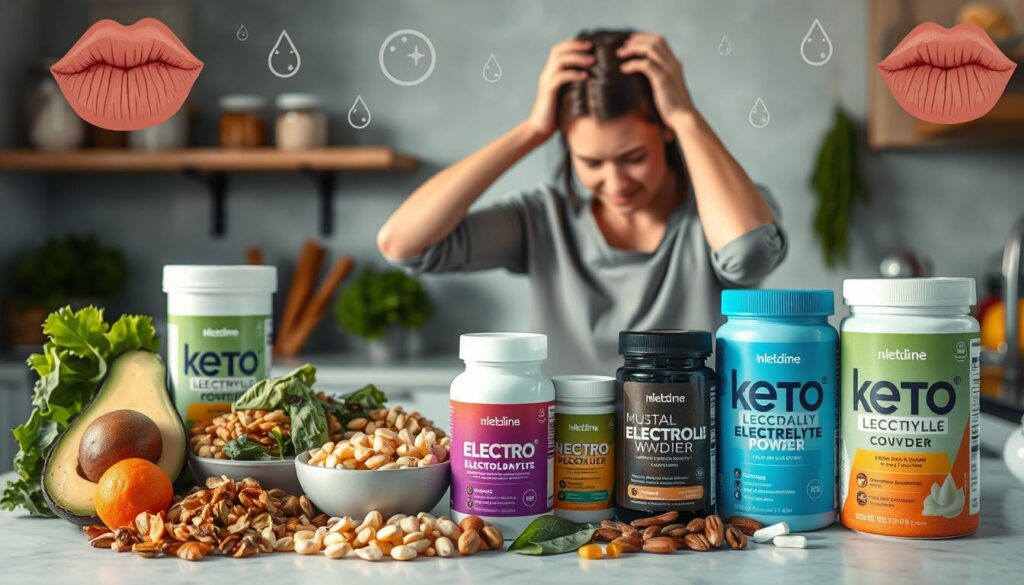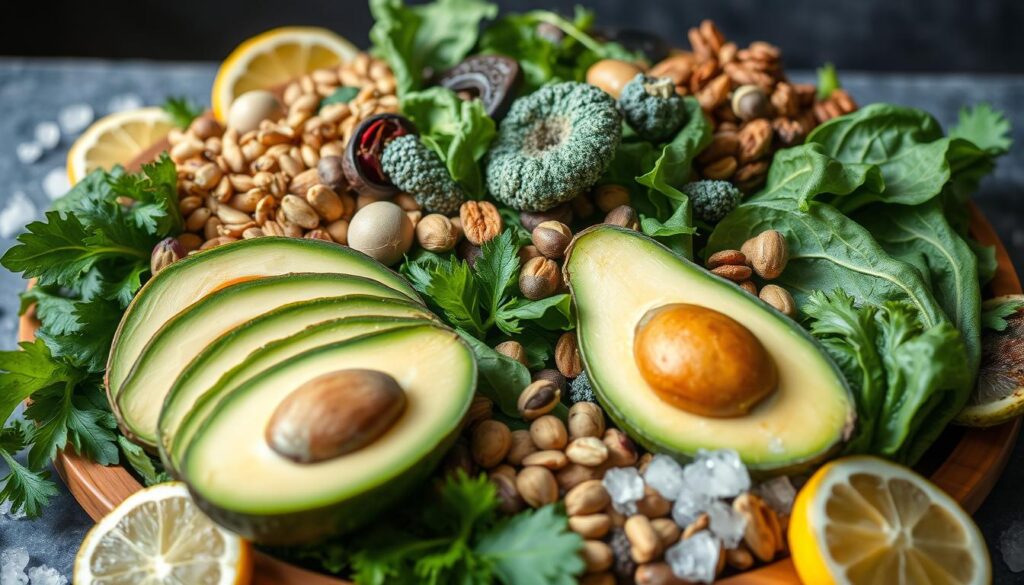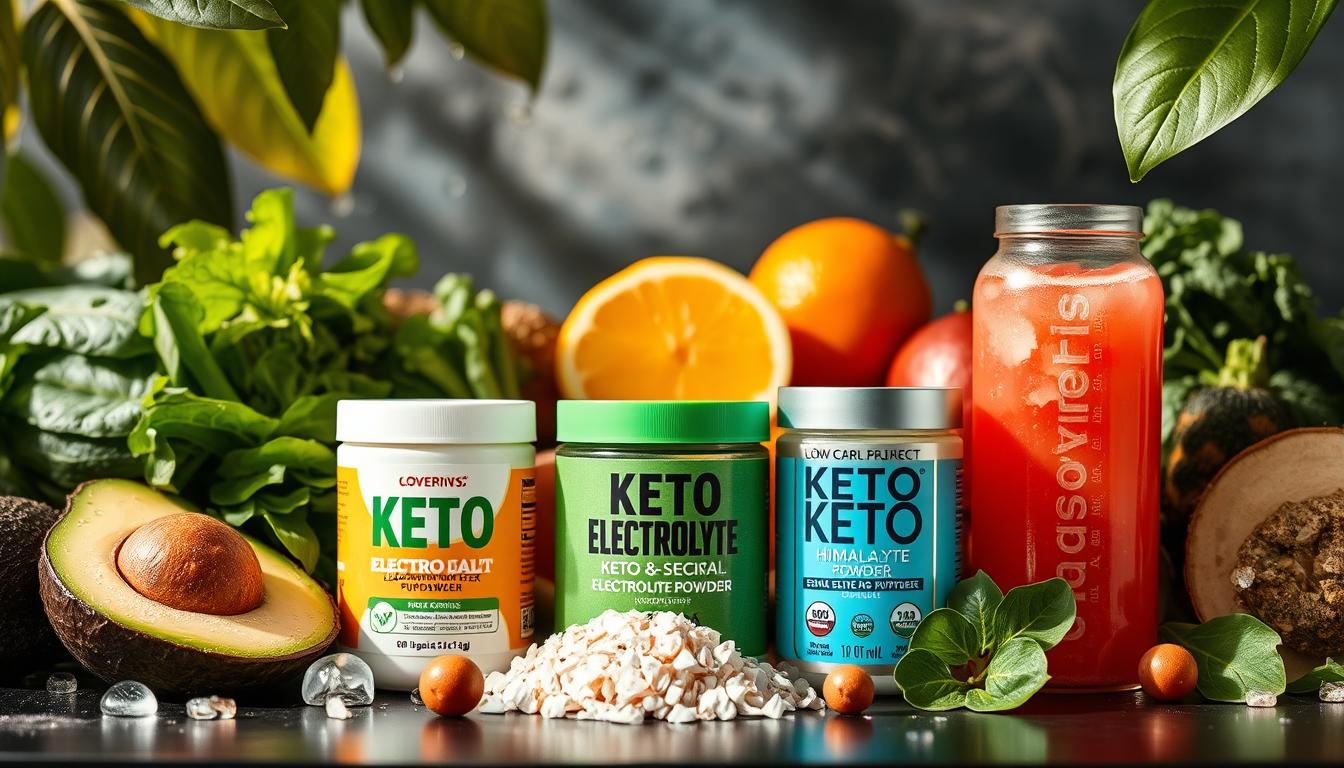Have you ever wondered why keeping electrolyte balance is key on a low-carb ketogenic diet?
The ketogenic diet is more than just a weight loss plan. It’s a big change in how your body uses energy, used since the 1920s1. When you start burning fat instead of carbs, you enter ketosis. This requires careful management of electrolytes to avoid muscle cramps and fatigue12. It’s important to replenish electrolytes like sodium, potassium, magnesium, and calcium. They help with muscle contraction, staying hydrated, and nerve signals23. With keto’s growing popularity, paying attention to these nutrients is crucial to avoid ‘keto flu’ and stay healthy.
Key Takeaways
- Ketosis is a metabolic state beneficial for fat burning but demands careful management of keto mineral supplements.
- Electrolytes like sodium, potassium, magnesium, and calcium are vital to maintain hydration and muscle function.
- Symptoms like headaches, fatigue, and muscle cramps can indicate electrolyte deficiencies3.
- A low-carb diet increases the need for replenishing electrolytes to prevent imbalances2.
- Integrating electrolyte supplements and keto-friendly drinks can help maintain essential nutrient levels.
To learn how stem cell therapy technology is a good solution For any Health Challenge – contact us at stemboostx @ gmail.com with subject “Techtest”.
Understanding the Keto Diet
The ketogenic diet, or keto diet, has become very popular lately4. It focuses on using fat as the main energy source when carbs are low. This leads to a state called ketosis4.
What is Ketosis?
Ketosis is when your body uses fat for energy instead of carbs. This happens when you eat fewer carbs. Your body then turns fat into ketones for fuel. This change can bring many health benefits and is key to the keto diet4.
Different Types of Ketogenic Diets
There are many kinds of ketogenic diets, each for different needs and likes:
- Standard Ketogenic Diet (SKD): This diet is very low in carbs, moderate in protein, and high in fat.
- Cyclical Ketogenic Diet (CKD): It has periods of higher-carb refeeds, like 5 ketogenic days followed by 2 high-carb days.
- Targeted Ketogenic Diet (TKD): This diet adds carbs around workouts to help with intense exercise.
- High-Protein Ketogenic Diet: It’s like SKD but with more protein.
Each diet needs careful tracking of macronutrients to keep ketosis going. This is how you get the metabolic fasting benefits.
Benefits of the Keto Diet
Ketogenic diets are known for their weight management and health benefits. Many people lose fat and feel full, which can help them eat less4. Athletes on low-carb diets also see better body shape and performance over time4. Electrolytes like sodium, potassium, and magnesium are key for staying hydrated and healthy during a keto diet5. They help avoid the “keto flu” symptoms6.
To learn more about stem cell therapy for health challenges, email us at stemboostx@gmail.com with “Techtest” in the subject.
The Importance of Electrolytes
Keeping the right balance of electrolytes is crucial, especially for those on a ketogenic diet. Electrolytes are minerals that help with muscle contractions, heart function, and energy production. The keto diet can lead to losing water and essential minerals through urine, sweat, and breath7.
What Are Electrolytes?
Electrolytes are minerals in your body that carry an electric charge. They are key for many functions like nerve and muscle work, hydration on keto, blood pH, blood pressure, and fixing damaged tissue. Without the right balance, your body can’t do these important tasks well.
Role of Electrolytes in the Body
Electrolytes have several important roles. Sodium helps with fluid balance, muscle contraction, and nerve signals7. Potassium is vital for cell, kidney, heart, muscle, and nerve functions. A lack of it can cause muscle cramps, digestive issues, and fatigue7. Magnesium is important for over 300 biochemical reactions, including muscle and nerve function and blood sugar regulation7. Getting enough electrolytes helps avoid symptoms like headaches, brain fog, sugar cravings, and fatigue.
Common Electrolytes and Their Functions
| Electrolyte | Function | Sources |
|---|---|---|
| Sodium | Maintains fluid balance, muscle contraction, nerve function7 | Salt, meat, fish |
| Potassium | Regulates cell and muscle function, prevents muscle cramps7 | Avocado, spinach, nuts |
| Magnesium | Supports nerve function, muscle function, and blood sugar regulation7 | Leafy greens, nuts, seeds |
| Calcium | Essential for vascular contraction, muscle function | Milk, cheese, yogurt |
| Chloride | Maintains fluid balance | Salt, seaweed, olives |
| Phosphorus | Bone and teeth formation | Meat, fish, dairy |
Staying hydrated and getting the right mix of minerals is key on a ketogenic diet. Proper hydration on keto helps keep electrolyte balance, avoiding unpleasant effects8. Adding electrolyte supplements and eating keto-friendly foods rich in these minerals helps your body work best.
Keto Electrolytes and Their Role
The ketogenic diet has become very popular in the last 15 years. It’s known for helping with weight loss and improving health. It was first used in the 1920s to treat epilepsy9. Electrolytes like sodium, potassium, and calcium are key for our bodies. They help our muscles work right and keep our body’s pH balanced9.
When you eat less carbs on a keto diet, your kidneys get rid of more sodium10. This can be a problem because we need these minerals to stay healthy.
Not eating foods high in carbs means we might not get enough electrolytes. This can lead to headaches, muscle cramps, and feeling very tired9. To avoid these problems, we need to make sure we have enough electrolytes. This is why keto electrolytes are so important.
The CDC says we should only have 2,300mg of sodium a day. But people on a keto diet might need more to stay balanced10. This shows how important it is to keep an eye on our electrolyte levels.
Magnesium and potassium are especially important for athletes on a keto diet. They lose these through sweat when they exercise10. Not having enough can be very dangerous, even leading to heart problems9.
Genius Gourmet has a Keto Electrolyte Blend that helps with all these issues. It has vitamins D3 and B6, calcium, magnesium, and more. It’s designed to keep you hydrated and support your body’s functions9.
Signs of Electrolyte Deficiency on a Keto Diet
Starting a keto diet can lead to electrolyte deficiency, known as the “keto flu.” It’s important to know these signs to prevent keto flu and stay healthy.
Symptoms of Keto Flu
People new to the keto diet often face the “keto flu.” Symptoms include headaches, muscle cramps, and feeling tired. Low sodium levels often cause these problems11.
To fight these issues, eating about 2 teaspoons of salt daily is suggested11. Potassium and magnesium shortages can make muscle cramps and mood swings worse12.

Long-Term Risks of Electrolyte Deficiency
Long-term, electrolyte shortages can be very dangerous. They can cause coma, seizures, and heart problems12. Potassium is key for a healthy heart12.
Getting enough potassium, about 4.7 grams a day, can lower kidney stone and blood pressure risks11. Low magnesium can cause muscle cramps and trouble sleeping12. Foods like dark chocolate and avocados are good for magnesium11.
It’s clear that watching and fixing these imbalances is key for staying healthy on a keto diet. Taking steps to prevent keto flu and talking to doctors regularly can help avoid these dangers.
How to Incorporate Electrolytes into Your Keto Diet
Keeping your electrolyte levels right is key for keto dieters. You can do this by eating foods rich in electrolytes, drinking plenty of water, and using keto-friendly drinks and supplements.
Food Sources of Electrolytes
Many foods can help boost your electrolyte levels on a keto diet. Avocados are great for potassium and magnesium, making them a good swap for bananas. Leafy greens like lettuce and kale add potassium, calcium, and magnesium to your meals13.
Bone broth is also a top choice, packed with sodium, potassium, and other minerals13. Nuts and seeds like pecans and almonds add magnesium and calcium to your diet13. Salmon is full of minerals and healthy fats, making it a great keto food13.
Importance of Hydration
Drinking enough water is crucial on a keto diet. It helps your body work right and prevents keto flu. Drinking water helps your body absorb electrolytes, keeping your nerves and muscles working well.
Athletes need to drink more water because they lose more electrolytes through sweat14. This is why they often need to take extra electrolyte supplements.
Keto-Friendly Electrolyte Drinks
Keto-friendly electrolyte drinks are a handy way to get back minerals. Ultima Replenisher® is a sugar-free mix that helps with hydration and electrolyte balance13. These drinks are made for low-carb diets, keeping your electrolyte levels in check.
Supplements to Consider
Supplements are a good way to make sure you get enough electrolytes. Genius Gourmet Keto Electrolyte Blend is a favorite, offering a mix of minerals in easy-to-take capsules13. Supplements help avoid imbalances and symptoms like muscle cramps and fatigue, making it easier to stick to keto.
Sodium in a Keto Diet
Sodium is key for keeping fluids balanced and nerves working right. But, it can be hard to get enough on a keto diet because of less processed foods. People on a keto diet should watch their sodium intake closely. They should aim for 2,000 to 4,000 mg of sodium daily, more than the usual 2,300 mg limit15.
It’s important to keep an eye on electrolytes, especially sodium, on a keto diet. This helps avoid feeling tired or getting headaches. Electrolytes like sodium help control blood pressure and muscle movements16.
There are many ways to get enough sodium on a keto diet. Salt is a fast way to get sodium and chloride. Different salts like Himalayan or sea salt have about the same amount of sodium chloride15. It’s also important to replace electrolytes regularly, especially when you sweat or go to the bathroom16.
Bone broth is a great choice, too. It has sodium and other important minerals like potassium and magnesium. Leafy greens and nuts and seeds also have these minerals, helping to keep electrolytes balanced15.
For a balanced diet, keto dieters might use zero-carb, sugar-free electrolyte drinks. Ultima Replenisher® mixes are good for adding electrolytes and staying hydrated during the keto diet’s start15.
- Leafy Greens: Provide a range of electrolytes like potassium, calcium, and magnesium15.
- Bone Broth: Offers important minerals like sodium, potassium, and magnesium15.
- Nuts and Seeds: Are full of magnesium, calcium, and potassium15.
Potassium and Magnesium: Key Players
Potassium and magnesium are key for keeping the body’s electrolyte balance right, especially on a keto diet. They help keep fluids balanced, support muscles, and aid in many chemical reactions.
Benefits of Potassium
Potassium is key for keeping fluids balanced and blood pressure in check. On a keto diet, it helps avoid high blood pressure and muscle cramps17. Foods like avocados and leafy greens are rich in potassium. They help keep electrolytes balanced and boost health.
Each 3-capsule serving of Nutri-Align Keto Electrolytes has 297mg of potassium. This is 15% of the Nutrient Reference Value in Europe and 6% of the Daily Values in the USA17.
Benefits of Magnesium
Magnesium is vital for over 300 body functions, including muscle and nerve health18. On a keto diet, aim for 200-400 mg of magnesium daily to fight muscle cramps, sleep issues, and irritability18. Nutri-Align Keto Electrolytes offer 300 mg of magnesium per 3 capsules.
This covers 80% of the European Nutrient Reference Value and 75% of the Daily Values in the USA17. For those on low-carb diets, magnesium is crucial. It helps prevent deficiencies and keeps overall health in check.
To learn more about electrolytes on a keto, see this detailed guide17.
Calcium and Other Essential Minerals
Calcium is key for strong bones and muscles. Low calcium in the blood, called hypocalcemia, affects 8% to 14% of people19. Though rare, ketotic hypercalcemia has been seen in four kids19. It’s important to watch calcium levels on a low-carb diet19.

Eating foods rich in calcium, like dairy and leafy greens, helps avoid deficiency. Nutrient-rich keto diets might also suggest taking calcium supplements to keep levels right.
Role of Calcium
Calcium does more than just support bones. It’s also vital for blood vessels, muscles, nerve signals, and cell functions. On a keto diet, not getting enough calcium can cause muscle cramps and tiredness20. Foods like salmon, spinach, and certain supplements can help.
Other Important Minerals
Other minerals like sodium, potassium, magnesium, and phosphorus are also crucial. They help keep the body’s electrolyte balance and metabolic functions in check. Magnesium, for example, is important for muscle relaxation19. A balanced mix of these minerals, like in a Keto Electrolyte Blend, is key to avoiding serious health problems20.
In short, eating keto foods and possibly taking supplements can help get these minerals. This prevents the bad effects of not having enough.
| Mineral | Recommended Sources |
|---|---|
| Calcium | Dairy, cruciferous vegetables, salmon, supplements |
| Magnesium | Pumpkin seeds, spinach, supplements |
| Sodium | Pickle juice, salt, electrolyte supplements |
| Potassium | Spinach, salmon, potassium supplements |
To learn about stem cell therapy for health challenges, email us at stembboostx @ gmail.com with “Techtest” in the subject.
Conclusion
Starting a keto journey needs a balanced plan for good health. Keeping electrolyte levels right is key. Electrolytes like sodium, potassium, and magnesium are lost more when eating less carbs. This can lead to tiredness, muscle cramps, and headaches21.
Eating foods like avocados, spinach, nuts, and pickles can help. These foods are rich in the needed minerals21.
Using keto-friendly drinks and supplements is also helpful. They should match your activity level and how much you sweat22. Aim for 2,300-2,500mg of sodium, 2,600-2,800mg of potassium, and 300-400mg of magnesium daily21. Always talk to a doctor for advice22.
Managing electrolytes is vital for a successful keto diet. By using different sources of electrolytes, watching your intake, and using supplements, you can stay healthy. For more on how stem cell therapy can help, check out our recommended resource.
FAQ
What is ketosis?
Ketosis is when your body uses fat for energy instead of carbs. This happens when you eat a low-carb, high-fat diet.
What different types of ketogenic diets exist?
There are many ketogenic diets. The Standard Ketogenic Diet (SKD), Cyclical Ketogenic Diet (CKD), Targeted Ketogenic Diet (TKD), and High-Protein Ketogenic Diet are some examples. Each has different levels of carbs and proteins.
What are the benefits of the keto diet?
The keto diet helps you lose fat, reduces hunger, improves blood sugar, and boosts mental focus.
What are electrolytes?
Electrolytes are minerals that help your body work right. They include sodium, potassium, magnesium, and others. These minerals are key for muscle and nerve health.
Why are electrolytes important for the body?
Electrolytes keep your body balanced and help with muscle and nerve functions. They also help with energy and keeping blood acidity right.
What are common electrolytes and their functions?
Common electrolytes are sodium, potassium, magnesium, and calcium. Sodium helps with fluid balance and nerves. Potassium is for muscles and blood pressure. Magnesium helps with nerves and energy. Calcium is for bones and muscles.
What is the role of electrolytes in a keto diet?
Electrolytes are key in a keto diet. They help replace what’s lost due to more urine and less insulin. This prevents “keto flu” symptoms.
What are the symptoms of electrolyte deficiency on a keto diet?
Electrolyte deficiency can cause headaches, muscle cramps, and fatigue. It can also lead to insomnia and dizziness. Severe cases can cause seizures and heart problems.
How can I incorporate electrolytes into my keto diet?
Eat foods rich in electrolytes like leafy greens and nuts. Drink plenty of water and use keto-friendly drinks. Supplements can also help.
What is the importance of sodium in a keto diet?
Sodium is vital for fluid balance and nerve function. It’s often low in keto diets. Aim for 2,000 to 4,000 mg daily to avoid fatigue and headaches.
What are the benefits of potassium in a keto diet?
Potassium helps with fluid balance and prevents muscle cramps. It’s found in avocados and leafy greens.
How does magnesium benefit a keto diet?
Magnesium is important for muscle function and energy. It helps prevent cramps and fatigue. Find it in nuts, seeds, and fish.
What is the role of calcium and other essential minerals in a keto diet?
Calcium is crucial for bones and muscle function. Phosphorus is also important for bones. Get them from dairy and cruciferous veggies in a keto diet.
Source Links
- https://www.geniusgourmet.com/blogs/keto/you-need-keto-electrolytes-on-a-keto-diet-heres-why?srsltid=AfmBOorT-O20Vq-8iuZX29uINxsK1WEBLkYFrTF88Ah3t8NgsFtIxV4I – You Need Keto Electrolytes On a Keto Diet: Here’s Why
- https://ketone.com/blogs/blog/ketosis-keto-electrolytes-tips-and-concerns?srsltid=AfmBOoo8VlZrlYsIxRP1Lza7DeyKbhd6cEs09QSqB-qVH04KrkBAXR0F – Keto Electrolytes: Tips and Concerns
- https://science.drinklmnt.com/low-carb/keto-electrolytes/ – Keto electrolytes: Benefits and best sources
- https://ketone.com/blogs/blog/ketosis-keto-electrolytes-tips-and-concerns?srsltid=AfmBOopFcKhM8Yg8CC3ablLb_X3hLpmBnSoELO8i-wVKUdzuChEhWGQG – Keto Electrolytes: Tips and Concerns
- https://www.lovelifesupplements.co.uk/blogs/love-life-health-blog/benefits-of-electrolytes-on-a-keto-diet-how-to-avoid-electrolyte-imbalances?srsltid=AfmBOopcle_OfX_JyYfxvhzEPjsfEBPWlQ5Uxyo3JMLKYInxYJWmmsvp – Benefits of electrolytes on a keto diet – how to avoid electrolyte imb
- https://www.ultimareplenisher.com/blogs/blog/8-tips-to-replenish-electrolytes-on-a-ketogenic-diet?srsltid=AfmBOopj-jww-5WDyzkndWI7QYygQTZRwGmpnvMvWGGWJ038YzCbsA3k – 8 Tips to Replenish Electrolytes on a Ketogenic Diet
- https://www.lovelifesupplements.co.uk/blogs/love-life-health-blog/benefits-of-electrolytes-on-a-keto-diet-how-to-avoid-electrolyte-imbalances?srsltid=AfmBOoqhvX0gwj5DAgxkYT5RfWQCFALvvjmakvZGGva_9DChQaDRQzqj – Benefits of electrolytes on a keto diet – how to avoid electrolyte imb
- https://rootd.com/blogs/vitamins-minerals-101/why-you-need-electrolytes-on-keto?srsltid=AfmBOoqxPZWjcv3oPVw-YE-fs0VKsoY16t3pV3Se3gg23nc0k_fiBx70 – Why You Need Electrolytes On Keto
- https://www.geniusgourmet.com/blogs/keto/you-need-keto-electrolytes-on-a-keto-diet-heres-why?srsltid=AfmBOopMc3Y4b5SadtgrUq5Uo8yBxPR9bO6sDU5w6TsymoEJa3U0RJt1 – You Need Keto Electrolytes On a Keto Diet: Here’s Why
- https://ketone.com/blogs/blog/ketosis-keto-electrolytes-tips-and-concerns?srsltid=AfmBOoo3hL1kCRGaPiy8dqKvstXuR4nL2x-ncv9OJnUuxb4cpI9JWGNs – Keto Electrolytes: Tips and Concerns
- https://www.carbmanager.com/article/xtqunbeaacaacgdw/importance-of-electrolytes-on-keto – How To Get Enough Electrolytes On Keto
- https://perfectketo.com/electrolytes-on-keto/ – Electrolytes on Keto: Benefits, How to Meet Them, and More – Perfect Keto
- https://www.ultimareplenisher.com/blogs/blog/8-tips-to-replenish-electrolytes-on-a-ketogenic-diet?srsltid=AfmBOopB0NYByVf1cR2ekPHCI_ju4rCdEX2tW5oBEVeiX5WbsD22-fqH – 8 Tips to Replenish Electrolytes on a Ketogenic Diet
- https://ketone.com/blogs/blog/ketosis-keto-electrolytes-tips-and-concerns?srsltid=AfmBOooOH-9d2lJRatE4-tlg7iX62-u6tCBZA90fWwumTEImovwZODho – Keto Electrolytes: Tips and Concerns
- https://www.ultimareplenisher.com/blogs/blog/8-tips-to-replenish-electrolytes-on-a-ketogenic-diet?srsltid=AfmBOop6Tv_p6iJpB-a0TqWx7-EsC3p5f1Vx8vO1Y32rq1ISICupHXxe – 8 Tips to Replenish Electrolytes on a Ketogenic Diet
- https://www.geniusgourmet.com/blogs/keto/you-need-keto-electrolytes-on-a-keto-diet-heres-why?srsltid=AfmBOorayRwcdgvp6_rKHSBc-73Fylj-WNadPNl2lmrRISv__iEBM02x – You Need Keto Electrolytes On a Keto Diet: Here’s Why
- https://www.nutri-align.com/product/keto-electrolytes/ – Keto Electrolytes
- https://www.healthline.com/nutrition/best-keto-supplements – The 9 Best Keto Supplements
- https://www.codeage.com/products/keto-electrolytes?srsltid=AfmBOopxLl9yfbcfVNAMbMUXh4dbo8MnIPuM3q1lez1DKUcFiE8pKSwr – Keto Electrolytes
- https://www.geniusgourmet.com/blogs/keto/you-need-keto-electrolytes-on-a-keto-diet-heres-why?srsltid=AfmBOoqdU9AJwfTlcoFnfiU-OzNls1WkNCAwKtXkGmLq2sebn7-DhDG2 – You Need Keto Electrolytes On a Keto Diet: Here’s Why
- https://www.groovyketo.co.uk/blogs/keto-articles/keto-electrolytes-essential-for-success-on-the-ketogenic-diet?srsltid=AfmBOopAdsfy6148HF_duPEkarrIuRJznerLkHKm4HcN06hLJB7yDKOj – Keto Electrolytes: Essential for Success on the Ketogenic Diet
- https://mlcclinic.com.au/keto-diet-and-electrolytes/ – Keto Diet and Electrolytes | Why They’re Essential For Keto


